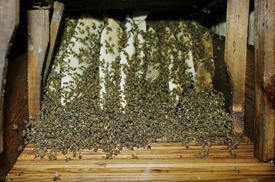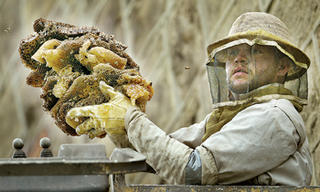
 The Derrick out of Oil City, PA has the following story:
The Derrick out of Oil City, PA has the following story:KNOX - Imagine singing praises to God with a million bees buzzing behind your bonnet.
That's exactly what the congregation of St. Mark United Church of Christ in Monroe, Clarion County, has been doing for the past seven years.
Honeybees have infested the walls of the sanctuary, and the gooey moisture from honey has been seeping from the walls.
Lee Stroup, the church's maintenance worker, said the congregation has known about the problem for years but has not been able to stop the bees from spreading.
"We've tried to get rid of them. We even had (an exterminator) come in, but it didn't work," said Stroup. "I have continuously resealed and repainted the walls trying to stop the moisture from the honey from seeping in."
The church has now hired McCool's Wildlife Removal of Rocky Grove to remove the honey, relocate the bees to a local beekeeper and seal the damaged walls to permanently resolve the problem.
McCool's is the only pest control business in the area that will remove and relocate bees.
Eric McCool, owner of McCool's, is working on the project with his son, Nicholas. They are spending three to four days this week on the church assignment because of the difficult-to-reach location of the bees. Most bee-removal jobs are done in a day, he said.
"The building itself complicates the removal," McCool said. "We have to use a 100-foot boom to do the job. This is dangerous because of the height and the electrical wiring. Then we also have to worry about the liability of the stained-glass windows," said McCool.
Using the boom has already caused McCool to be stung between 100 and 130 times.
"I was attacked because I couldn't move the boom away from the church fast enough because of the dangers," he said. "I ended up going to the emergency room. Even though I'm not allergic, any time you have a large amount of venom, you have a toxic reaction."
Despite being stung, McCool collected about 55 pounds of honey on Tuesday, which will be melted down for beeswax. That's only a small amount compared to the additional 500 pounds he expects to extract from the rest of the building.
When McCool relocates the bees, he will suit up in a bee suit to avoid being attacked.
"When you evict bees out of their homes, they're not too happy. We have to suit up for that part and use smokers. We also carry bee spray in case they attack," McCool said.
Once the bees are removed, McCool will finish fixing the moisture problem inside the church by drilling holes in the walls and removing the rest of the honey.
The entire project will cost around $2,600, but it won't interrupt regular worship services. Although some bees sneak into the sanctuary, no parishioners have been stung, Stroup said.
"We've never had to hold church elsewhere. We'll have church this Sunday," said Stroup. "We just wanted them gone so no one gets stung."
McCool said bee infestations aren't uncommon in the area.
"It's becoming more of a problem in buildings and in homes. Bees can get into small areas and people can have nests growing for 30 years and not know it," said McCool. "This is a medium-sized job. I've seen larger."
He estimated that about 1 million bees will have been removed from the church building by the time the job is completed.
No comments:
Post a Comment